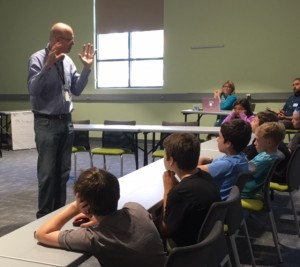The STEM Challenge team recently co-hosted a workshop at the The Tech Museum of Innovation with Cogswell College. John Duhring, Director, Strategic Alliances and Alumni Relations, provides some insight into some career paths for students interested in exploring a future in game design and development.

There is an urgent call across U.S. universities to better prepare students for careers. Current research reveals that students decide to go to college primarily to improve their employment opportunities. They look to colleges to equip them to work not only in traditional jobs, but to also prepare them for a world that is changing beyond description. They are fully aware that pursuing narrow silos of knowledge defined by academic disciplines may not help their careers as much as acquiring useful skills and the disposition to put what they have learned to effective use. Rather than sit through lectures, take quizzes and prepare for graduate schools, undergraduate students are increasingly opting to practice in college what they hope to pursue as a career.
For students with aspirations of careers in high tech, this means learning to work as part of a multi-disciplinary team in which roles change over time. No longer does a college graduate specialize in a single field and practice at increasing levels of responsibility for a single employer. Particularly here in Silicon Valley, graduates are thrust into dynamic environments and often given “make or break” responsibilities right off the bat. With success, they might be asked to move from, say, engineering to product management, to developer relations and on to marketing roles. They must relearn everything as technologies and markets change. They must repeatedly form new teams and embark on new missions with the gusto that can only come from loving what they do.
In this kind of environment, there may be no better career preparation than through degree programs in game design and development. Making games in college means working with teams of other students to combine art with technology to tell stories. It also happens to be a powerful way to dive into physics, history, linguistics, and other academic disciplines. Students are given increasing responsibility as their skills and professionalism mature. They can take on leadership roles on meaningful projects. They can bring inexperienced members of a team up to speed. They can try out new roles and work on new projects every semester, in an environment in which it is safe to fail. By learning from industry experts, using the latest technology and observing how their peers operate, college students augment their academic foundation with real world experience. Ultimately, these students create their own path through college, just as they will called upon to do throughout their careers.
Over 300 colleges and universities have established degree-granting baccalaureate programs. What if going to college was more like working in a game development studio? That is exactly what drives the curriculum at Cogswell College in San Jose, California. Students earn a fully accredited bachelors degree while gaining valuable industry experience by working with real clients and their peers to produce real games. Somewhat surprisingly, the “soft skills” of creative storytelling, critical thinking and managing multi-disciplinary teams provides the essence of the professional they become along the way.
At Cogswell, we regularly ask students to describe what they are working on. It’s often a challenge for new students to articulate the purpose of their work and their role in it, so we make videos of more accomplished students as they gain a sense of their professional direction. After they have graduated, their interviews describe some of the career options offered by the video game industry. The salaries noted are for starting positions. Accomplished graduates can see dramatic increases in compensation based on their professional capacities.
Concept Artist: Katie Fortune works at Machine Zone, the makers of Mobile Strike and the RealTime platform. She was interviewed while she was just learning about storyboarding and working with engineeers to build interactive experiences. The Glassdoor.com salary database reports starting salaries for 2D artists with the ability to sketch out characters, scenarios and stories average above $50,000 per year.
Technical Artist: Bugi Kaigwa works at Visual Concepts, the developer behind Take-Two’s interactive sports games, such as NBA2K. Technical artists develop the “rigging” of digital characters, the handles and structures that enable animators to make them move realistically. Glassdoor sites beginning technical artists average salaries of over $60,000 per year.
Game Engineering Manager: Sean Langhi worked at Google and then joined a start-up as co-founder. Typically, college students do not gain management experience while in college. Video game engineering managers salaries start over $65,000 per year, reports Glassdoor. Sean and Bugi speak about their roles building a video game in college.
Interactive Sound Engineering: Every video game injects realism into the experience through sounds that map to the users behaviors. Kaleb Grace now works as a Senior Software Engineer at Disney Interactive. Glassdoor suggests that starting sound engineering salaries start around $60,000. Kaleb talks about his experience in a school project.
Developer Support Engineer: Working with talented teams takes special skills. Tobiah Zarlez works for Microsoft as a Game Evangelist. According to Glassdoor, developer relations salaries start at $60,000. Tobiah speaks of his experiences managing the Game Development Club when he was a student.
Most students enter a game design program without a clear idea of the multitude of jobs to be filled in one of the most dynamic industries ever created. By making games in college, students discover where their skills and passions map to industry needs. Those who have a sense of purpose, who know what they are looking for or where they want to go, have a better chance at being accepted into college game programs. While their paths might change as they learn more about the industry, their passion, their skills and their ability to work in team settings make for highly desirable career outcomes.
 A graduate of UC Berkeley, John Duhring has applied technology to learning at Prentice-Hall, Dow Jones, Apple and for Stanford’s Professional Publishing Courses. He manages community affairs at Cogswell College in San Jose, California.
A graduate of UC Berkeley, John Duhring has applied technology to learning at Prentice-Hall, Dow Jones, Apple and for Stanford’s Professional Publishing Courses. He manages community affairs at Cogswell College in San Jose, California.

